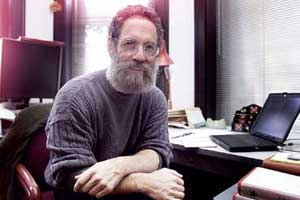Vernacularization in cultures originates from informed choices about language, literature
By Seth SandersNews Office
 Sheldon Pollock |
Although cosmopolitanism might be viewed as a solution to some problems, a fear also exists that across the world people are forgetting their own literary cultures and traditions and learning the cosmopolitan English, absorbing themselves in Hollywood movies and Western goods.
This worry has prompted a backlash, from the violence of Al Qaeda to the militant Hinduism of the ruling party in India, whose paramilitary organizations were recently involved in a massacre of more than 2,000 Muslims in the state of Gujarat.
But as a scholar of the intellectual and cultural history of pre-modern South Asia, Pollock, the George V. Bobrinskoy Professor of Sanskrit and Indic Studies in South Asian Languages & Civilizations and the College, has a different perspective.
He noted that “global” cosmopolitan cultures usually existed before local literatures arose. In his research, he has found that often people began to form literary traditions only in reaction to encounters with international languages and literary traditions, like those of Sanskrit, writing down their own vernacular languages in scripts borrowed or adapted from older, broader literary cultures. He has found similar things in the history of Latin and the regional languages of Europe.
Starting in both Western Europe and South Asia in the ninth century C.E, a wave of vernacular literatures began to spread; people started writing expressively in their local languages for the first time.
In an essay titled “Cosmopolitan and Vernacular in History,” Pollock details the phenomenon. “Vernacular literary cultures,” he said, “were initiated by the conscious decisions of writers to reshape the boundaries of their cultural universe. They renounced the larger world for the smaller place, and they did so in full awareness of the significance of their decision. New, local ways of making culture ... new ways of ordering society and polity came into being, replacing the older translocalism.” This idea will be argued at greater length in a book due next year, Cosmopolitan and Vernacular Before Modernity: Culture and Power in South Asia to 1500.
Pollock said the relationship between the older empires and languages is still a matter of debate. Using Latin as an example, he said, “It’s a great mystery how this local language from the Tiber Valley became a global language. Why did Latin win out? Other great imperial rulers like Darius of Persia and Ashoka of India were not interested in imperial languages or ‘cosmopolitanism’ at the level of culture.”
Pollock is trying to think through different ways of being imperial in the ancient world. “Of course, every imperial ruler shared the same basic goals. They wanted to beat up a lot of people and take their money. But they all did it in different ways–Augustus and Darius said they did it because god was on their side, whether Jupiter or Ahura Mazda, and he had granted them the title to the whole world. But no one in South Asia ever appointed a divine real estate agent–it’s a very important distinction in the history of political thought.”
Pollock noted that histories of language and literature usually are written as if such phenomena are forces of nature. “I’m trying to carve out a history of culture and power where people can be seen to make informed choices about what to do. Vernacularization does not take place like leaves falling in autumn or butterflies emerging from the chrysalis, but rather is a process of informed choice.
“Cultural affiliation has a major element of choice, including media choices. What language do I write in? It was under colonialism, many people think, that South Asians were first confronted with this problem. Do I use English? Do I write in the master’s language? But if we think historically we see a far deeper phenomenon of human culture. Is there an overall shape to these patterns of local and global, cosmopolitan and vernacular, in both culture and power? What kind of reality do they have for the people choosing the one or the other?”
![[Chronicle]](/images/sidebar_header_oct06.gif)